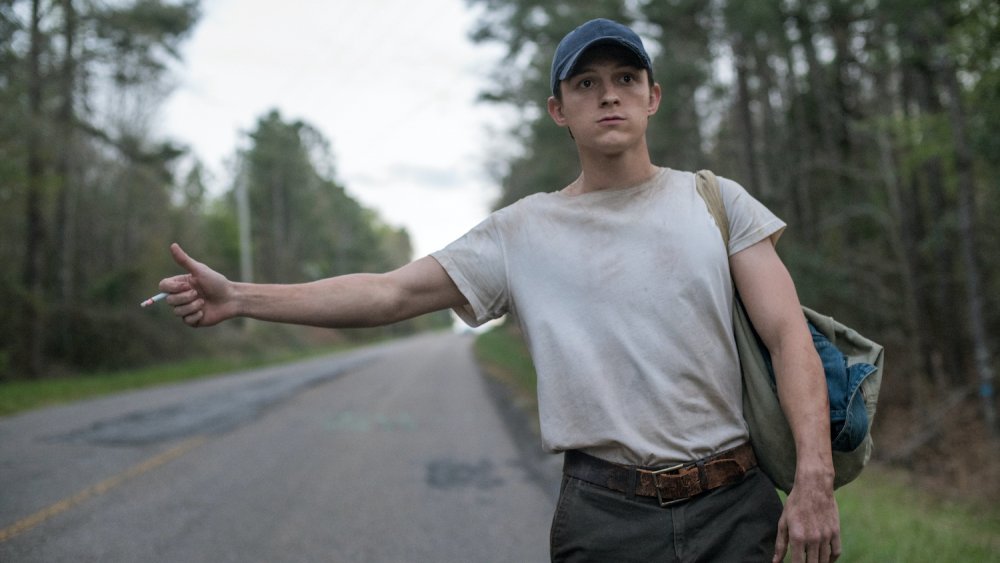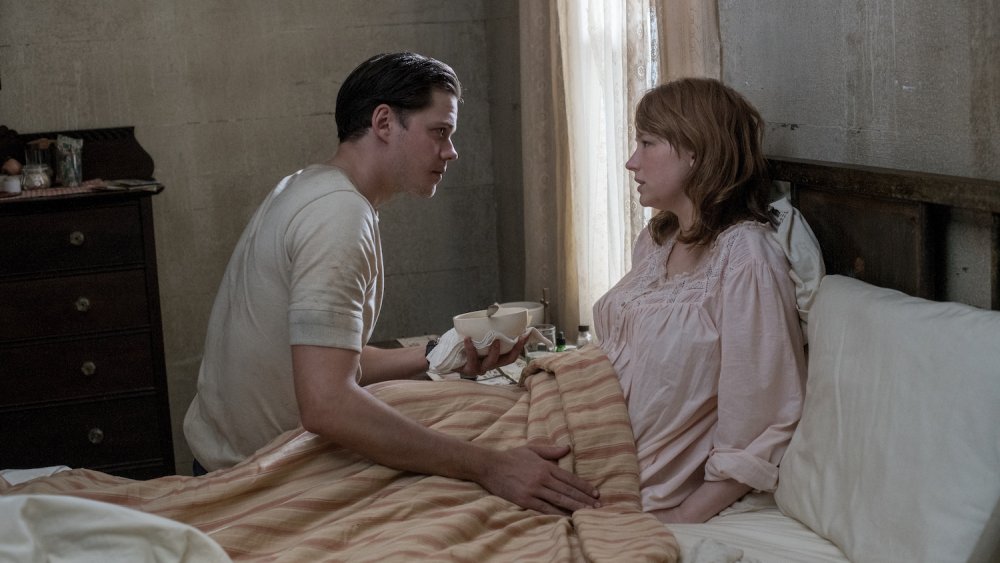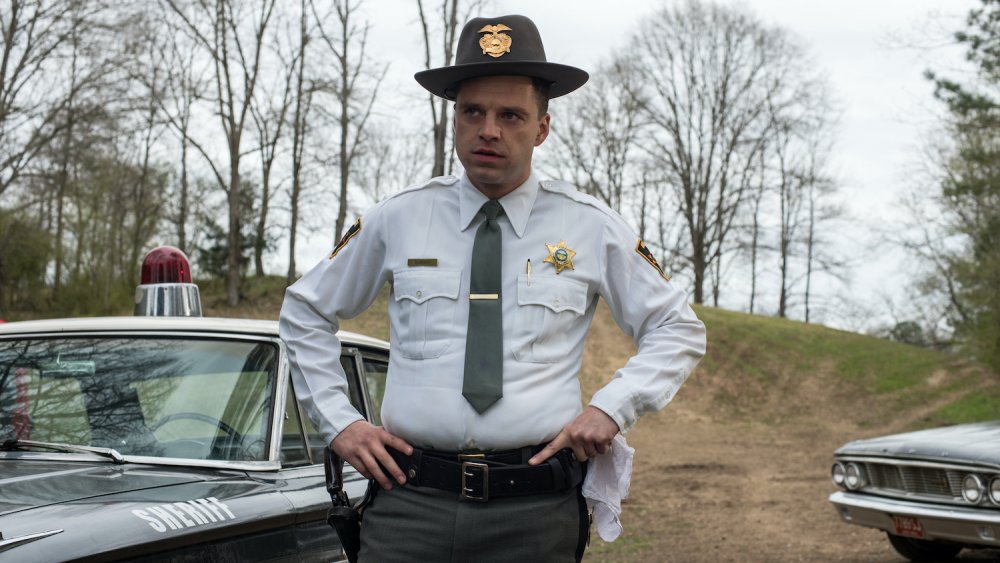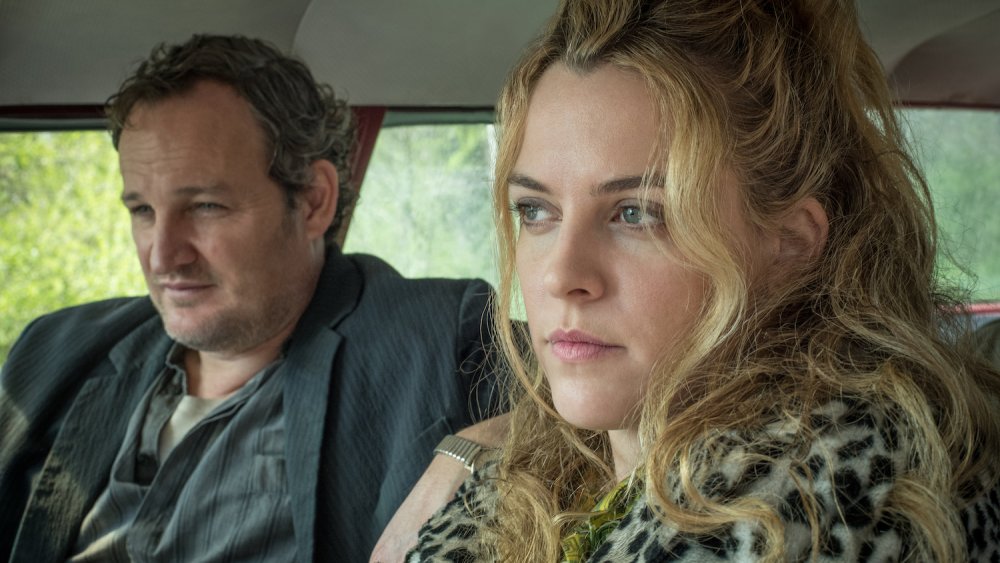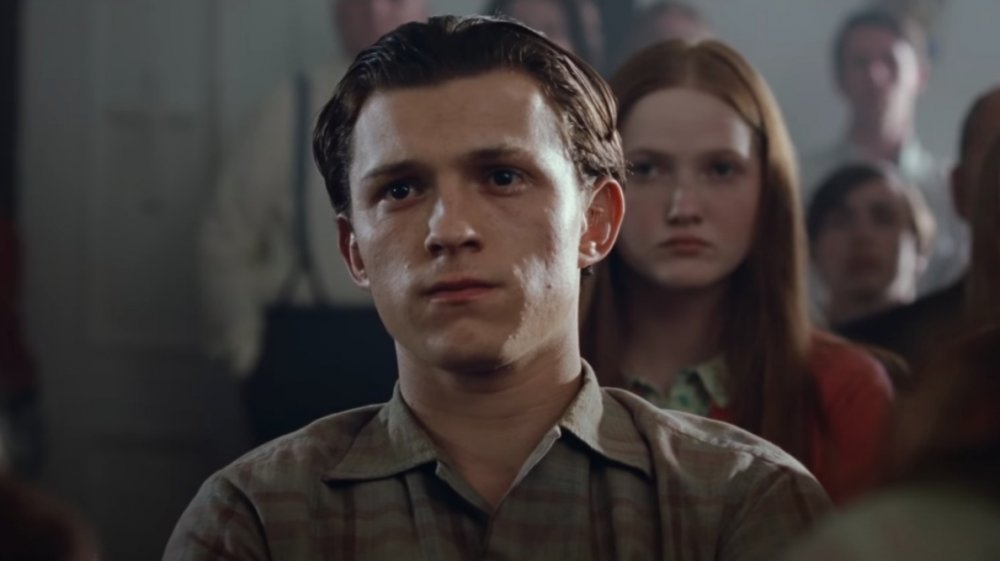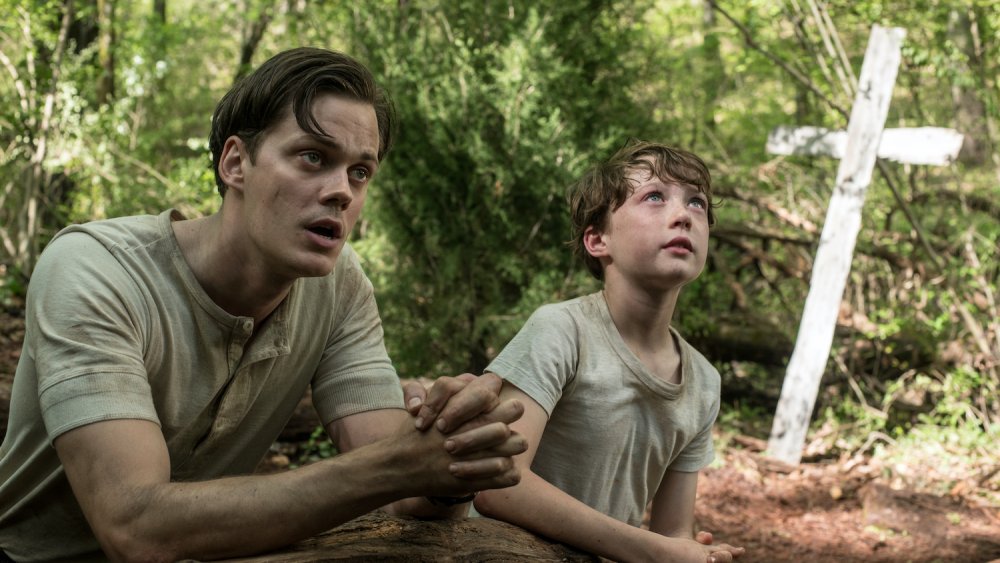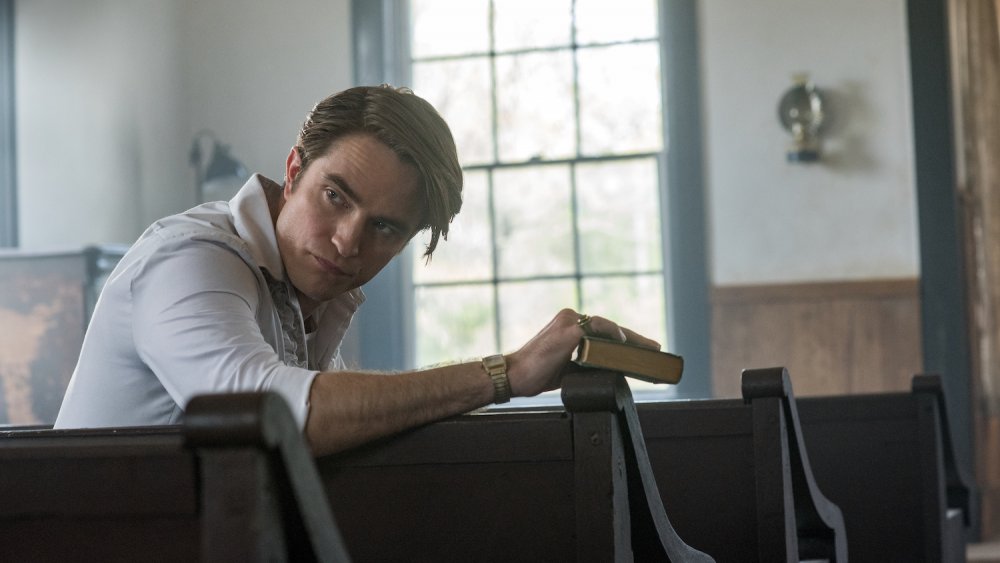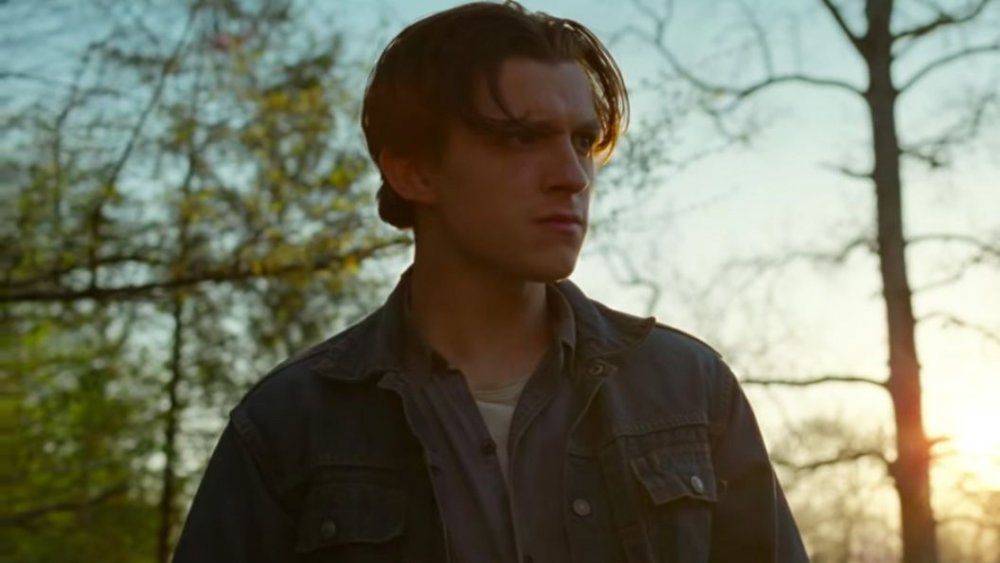The Ending Of The Devil All The Time Explained
In his Netflix adaptation of Donald Ray Pollock's 2011 novel The Devil All the Time, director Antonio Campos unites an all-star ensemble cast to play a group of intriguing, deeply troubled characters all wrestling with their inner demons in the rural setting of mid-20th century Ohio and West Virginia. Set in the years spanning the time between World War II and the Vietnam War, The Devil All the Time wrestles with tough themes including faith and the abuse of religion, corruption in the pursuit of power, and the cyclical nature of violence.
Although most of The Devil All the Time's interwoven plot points have been definitively — if not neatly — wrapped up by the end of the film, viewers may still leave with some questions about the finer details of what they just watched, along with what it's all supposed to mean. While on the surface, The Devil All the Time feels like an indictment of humanity, with nearly every character harboring dark secrets and giving in to destructive desires, there's a lot more going on in the film than just doom and gloom. With all that in mind we're digging into some of our biggest lingering questions after watching The Devil All the Time.
Warning, spoilers ahead.
Who's the narrator of The Devil All the Time?
The first person to speak in The Devil All the Time is someone who is never seen or named. He sets the stage for the film (the narrative is split between Coal Creek, West Virginia, and Knockemstiff, Ohio) and quickly explains the meaning of the title when he says that Willard Russell's (Bill Skarsgård) son thought that "his father fought the devil all the time," a theme that plays out in nearly all of the characters repeatedly during the story. This narrator continues to chime in throughout the rest of the film, tying the seemingly disparate stories together and commenting on the characters' motivations, doubts, and innermost thoughts.
As a matter of fact, the narrator is the book's author, Donald Ray Pollock. In the director's statement that accompanied screeners of the film, Campos explained, "I wanted to use a narrator to tell the story and build a world in which we gave a voice to the 'Creator.'" Of course, in a film that strongly centers themes of faith and religion, "Creator" can have two meanings: first, as the book's author, the literal creator of the story; and second, as an omnipotent God character, who comments on the story through an all-knowing yet detached lens. The narrator hints throughout — but never confirms — that God may have had a hand in arranging the clockwork-like events of The Devil All the Time, while never taking full responsibility for anything that happens. Pollock's inclusion as the narrator feels almost like a meta-commentary on the (often twisted) faith of the characters, showing that someone is indeed listening to their desperate prayers — and that it's actually the same individual who put them in their harrowing circumstances to begin with.
What happened to Arvin?
Although The Devil All the Time follows a large cast of central characters, its protagonist is indisputably Arvin Russell (Tom Holland), who is orphaned at a young age when his mother (Haley Bennett) is abruptly felled by cancer, and his father commits suicide immediately after her funeral. Before his father dies, he takes Arvin with him to watch him attack the men who had earlier threatened to come to his house and attack his wife. Arvin takes this brutal lesson in revenge to heart, and carries it with him for the rest of his life, first beating up the school bullies that routinely harass his adopted sister, Lenora (Eliza Scanlen), and then hunting down and executing Preston Teagardin, the twisted preacher (Robert Pattinson) whose abuse leads to her death.
Murdering Teagardin sets off a chain reaction of violence, as Arvin flees the scene of the crime only to be picked up by serial killers Carl (Jason Clarke) and Sandy (Riley Keough), who have spent the film picking up hitchhikers, photographing them in amorous poses with Sandy, and then killing them. Arvin kills the couple in self-defense, but is pursued by corrupt sheriff Lee Bodecker (Sebastian Stan), Sandy's brother, who is determined to cover up his sister's crimes and safeguard his reputation. Arvin winds up killing Bodecker as well, and ultimately hitches a new ride to Cincinnati. As he rides away, he considers one day going back home and making amends with his grandmother, starting a family of his own, or enlisting to fight in the Vietnam War. We don't know which — if any — of these paths Arvin ultimately takes, or if he'll be able to break the cycle of violence that's followed him his whole life. If the rest of the movie is any indication, while we're hopeful for Arvin, we're not optimistic.
How were each of the characters connected?
While The Devil All the Time's grim outlook on faith and religion seems to stand in opposition to the idea of an all-powerful God moving pieces around behind the scenes, many of the ways in which the characters' lives intersect do seem to point to the existence of some sort of divine force pulling the strings. For example, serial killers Carl and Sandy met on the same day, and at the very same diner, that Arvin's parents met. The four even had brief encounters with each other. Carl and Sandy would go on to murder Lenora's father Roy (Harry Melling), leading her to live with Arvin's grandmother, which is how Arvin and Lenora wound up as siblings.
Roy's death (following his murder of Lenora's mother Helen, played by Mia Wasikowska) opened the door for a new preacher at his church. Several years later, when that preacher began experiencing health trouble, his nephew wound up taking over for him. The nephew was Preston Teagardin, whose manipulation and seduction of the teenage Lenora led to his murder at the hands of Arvin, who then went on the run and was picked up by Carl and Sandy.
Sandy was the sister of Sheriff Bodecker; the two had grown up together after being orphaned at a young age, similar to Arvin and Lenora, and he'd gotten her the job at the diner where she met Carl. Bodecker was also the person who had been responsible for picking up young Arvin (Michael Banks Repeta) after his parents' death. Arvin ultimately kills Carl and Sandy, who never realize that their killer was the son of the man Carl met in the diner all those years ago, and the waitress who'd worked alongside Sandy.
Why was Sheriff Bodecker trying to kill Arvin?
At the end of The Devil All the Time, Lee Bodecker's determination to hunt down and kill Arvin doesn't feel motivated by brotherly grief over the murder of his sister, but by fear. What is Bodecker so afraid of? Well, pretty much everything. Bodecker has been chasing money and power since the first time we meet him, whether through winning his election to become sheriff or through taking bribes and cutting deals while holding his position. By the time Arvin is living through the events that will immediately precede his fateful encounter with Carl and Sandy, Bodecker is running for re-election, and is terrified that the skeletons in his closet could come spilling out.
At first, Bodecker is just afraid that his political opponent will discover that he's been taking bribes and greasing the wheels for local corrupt business owners, or that he's been looking the other way while his sister engages in sex work. Before Arvin ever crosses his path, he's already committed two murders to try to cover up his tracks. But the deaths of Sandy and Carl lead Bodecker to uncover their secret stash of photographs of their victims. Rather than do his duty as the sheriff and report what he's found, Bodecker destroys the evidence, terrified that if Sandy's activities come to light, it will cost him the election and all the money and power that comes with it. Arvin remains the one loose end, a witness to Sandy and Carl's crimes. Even though Arvin has no intention of sticking around, Bodecker is determined to make sure he can never reveal what he knows about Sandy. Unfortunately for him, Arvin is quicker on the draw, not to mention a better shot, and Bodecker's paranoia and lust for power winds up being his downfall.
Would Sandy have eventually left Carl?
We get a lot of clues throughout The Devil All the Time that Sandy is considering leaving her husband and abandoning their life of murder and secrecy. She gets as far as loading up her car and preparing to drive off, but ultimately has second thoughts and returns home. Later, right before she's killed, she considers killing Carl and driving off with Arvin, implying that she might even try to start a new life with him. But it turns out that Carl picked up on Sandy's growing reluctance to continue in their partnership, and that he'd grown distrustful of her, going so far as to replace the bullets in her gun with blanks, which is how Arvin's life is spared and Sandy's is lost.
But would Sandy actually have left, had she remained alive? We'll never know, but several signs point to no. First, of course, is the fact that she didn't leave when she had the chance. Even when she briefly considered killing Carl and leaving with Arvin, she didn't actually take any actions that indicated that she might follow through with it. Of course, that doesn't mean she never would have gone through with it, but the fact that she never takes any of the opportunities presented to her seem to indicate that while she liked the idea of leaving, she wasn't necessarily determined to actually do it.
But the biggest indicator that she would have stayed is that she actually enjoys what she and Carl do together. Before Sheriff Bodecker visits her house, we see her looking fondly at the photos of her and Carl's victims, showing that she's not just going along with the murders for his sake; she actually gets pleasure from it herself. As tired as she is of Carl, she doesn't seem able to give up the killing, which makes her marriage to him a necessary evil.
What was the significance of President Johnson's speech at the end?
As Arvin hitchhikes away from Knockemstiff at the end of the film, a snippet of an address by President Johnson plays on the radio, justifying his decision to send more troops to Vietnam. Only a small portion of his speech plays, including the phrase, "We cannot be defeated by force of arms or by superior power."
While one could dismiss the voices on the radio purely as background chatter, the quote that made its way into the film feels significant in a variety of ways. After all, Arvin's story began with another war, with his father returning from World War II haunted by his memories (and most likely, untreated PTSD) of what he experienced. Willard's background as a soldier in the war largely informed the way he parented Arvin, and how he taught him to solve his problems with vicious and extreme violence.
Then there's the choice Johnson is making, to commit more troops to fighting the war, and his declaration that the United States won't be strong-armed into backing down. This echoes Willard's philosophy that when someone else acts as an aggressor, the right thing to do is to "finish it," which he demonstrates by beating up the men who threatened his wife. It's a belief Arvin carries with him long after his father is gone, which is what drives him to attack Lenora's bullies and the preacher who abused her. Yet at the end of the film, as Johnson speaks, Arvin gives a tremendous yawn and begins to drift off and dream of a better life, perhaps symbolizing that he's managed to let go of this violent philosophy at last, and that it no longer holds power over him.
What is The Devil All the Time trying to say about faith?
Although it would be easy to walk away from The Devil All the Time thinking that the film is taking a firm stance against religion entirely, in his director's statement, Antonio says that one of the things that drew him to adapt the story is its exploration of generational faith, and the elements of religion that get passed down from parent to child. Campos explains that he was raised by a devout mother and a disillusioned father, and that rather than having his film serve as an indictment of faith and religion, he views this story as a way to explore it.
"Like the characters in the story, I've inherited a little bit of both my parents' extremes, and over the last several years, I've tried to understand these two extremes within me," writes Campos. "I still struggle with my faith and continue to question it, and as a filmmaker, I use storytelling to find answers."
The struggle of faith is clear and pervasive in The Devil All the Time, with many of the film's characters motivated or manipulated according to their strong religious convictions. It doesn't shy away from the many ways in which religion can be twisted to abuse, shame, and excuse harmful behaviors, but it also leaves the door open for the existence of God and some sort of larger divine plan. Speaking to Esquire, Campos said, "[The film] plays with two ideas: one, that things are random because there's the absence of God throughout the movie, but also the way that everything plays out suggests there is a bigger force at play. The movie is trying to explore human beings on earth struggling to connect and see God, showing there is some greater design but they can't see it."
What is The Devil All the Time trying to say about violence?
Running parallel to the themes of faith and religious fanaticism in The Devil All the Time, and how they can be passed from one generation to the next, is the theme of violence, and how that too can be passed down from parent to child. Some of the film's most heinous acts are committed by its most pious characters, such as when Willard kills and crucifies Arvin's dog as a sacrifice to try to convince God to heal Arvin's mother, or when Roy kills his wife, Helen, under the delusion that God has asked him to kill her so that she can then be resurrected (of course, she remains dead, and Roy buries her body in the woods).
But beyond the ties between religious extremism and violence, there's also a recurring theme of how giving in to violence always begets more violence. According to Campos' statement, The Devil All the Time is "a generational story about the cyclical pattern of violence [...] The story is very simply about what we inherit and what we pass on."
This pattern becomes extremely apparent in Arvin, who follows closely in his father's footsteps as far as how he deals with threats to his family. Even when Arvin decides to walk away from his life after killing the preacher, violence follows him, and three more people are dead by the end of the film — people who were all brought into Arvin's orbit due to violent cycles of their own. It's no coincidence that the narrative of the film is sandwiched between two wars, both of which left deep scars on history. With Arvin riding off at the end and dreaming of either starting a new life or enlisting in the war, the film seems to imply that there may be no escaping this brutal cycle — but that it's worth trying anyway.
What's the meaning of Arvin's story?
Not all films need to have a strong moral or deeper message, but in the case of The Devil All the Time, it seems as though there's definitely something the film is trying to communicate through Arvin. Overall, it's a pretty bleak story, with the vast majority of the characters meeting rather miserable and bloody ends. But against all odds, Arvin manages to survive and head off to seek a fresh start, although we'll never know if he's actually successful.
Of the ending of the film, Campos said in his director's statement, "Things just have a way of sorting themselves out in Knockemstiff, and even if you don't get a happy ending, there's still the potential for a better beginning." This seems to speak directly to Arvin's story, which culminates in a series of unlikely encounters which appear to nod to divine intervention.
Maybe it's the very improbability of Arvin's ending that speaks to hope for a better future. After all, the odds of Arvin crossing paths with the same people who met in the same room as his parents and killed his sister's father don't seem very high, nor do the odds of him surviving that encounter. Similarly, it doesn't seem likely that a kid with an old Luger pistol would outshoot a sheriff at point-blank range, yet that's exactly what happens. Perhaps the point of Arvin's story is to show that sometimes, people can beat the odds and break out of harmful cycles, no matter how deeply entrenched they are. In that sense, maybe the ending of the film isn't quite so bleak after all.


